Unique? They are. They are quiet, polite and they never want you to “take me to the mall.” But if you could ask them what they do want they would likely say, “To live–like everyone else.” They are called “extrauterine children.” And the controversy surrounding them isn’t going away anytime soon. The concerns they conjure in the American psyche deal with inflammatory issues in our society–issues many have not wanted to consider or worse, admit: when life begins, right-to-life, is an embryo a human being, what rights do embryos have, when does life achieve personhood and rights under the Constitution, bioethics, even eugenics.
The Alabama Supreme Court in February of this year created chaos and hysteria. Politicians and reproductive medicine advocates were particularly exercised with no small amount of what the Bible calls “gnashing of teeth” in the mainstream press. Terms like “Christian nationalism” were invoked to hype the moment and draw attention to one’s agenda, one’s cause celeb. Controversy arose after the court issued a decision declaring cryogenically frozen embryos to be “extrauterine children,” human beings with ‘personhood’–a right to live–to life.
In LePage v. Center for Reproductive Medicine, P.C. a fertility clinic that neglected to properly secure its frozen embryo nursery from a prying patient was found in breach of Alabama’s Wrongful Death of a Minor Statute, after several embryos were killed. The parents of the dead embryos were within their rights to sue the clinic, the court found.
The Alabama case is of paramount importance. It essentially forces America to deal with two pivotal issues we have been grappling with for years. First, with respect to the issue of right-to-life, the jurists made the law follow science. The overwhelming consensus among biological scientists is that life begins with conception at fertilization, thus an embryo is alive–it has life. Steven Andrew Jacobs of Northwestern Pritzker School of Law, University of Chicago writing in Issues Law Med. 2021 Fall, “The Scientific Consensus on When a Human’s Life Begins” is clear in his assessment:
“Peer-reviewed journals in the biological and life sciences literature have published articles that represent the biological view that a human’s life begins at fertilization (“the fertilization view”). As those statements are typically offered without explanation or citation, the fertilization view seems to be uncontested by the editors, reviewers, and authors who contribute to scientific journals. Overall, 95% of all biologists reviewed affirmed the biological view that a human’s life begins at fertilization (5212 out of 5502).” Up until the time of the Alabama case, that is where the matter stood. Life begins at conception, but no court or legislature (federal or state) has dared (politically) to comment on the status of that life as a ‘human being’. The hesitation occurs because with the status of humanness comes the delicate issue of personhood. And with the latter comes the issue of rights. If embryos are humans and therefore persons, what rights do they have under the Constitution? Are they protected by the 14th Amendment’s equal protection and due process clauses under the law? The Alabama Supreme Court seems to think so.
The Court held that any exceptions for the wrongful death statute not to cover ‘extrauterine children’ would violate the 14th Amendment’s equal protection clause. The latter prohibits states from withholding protections from people based upon “immutable features of their birth or ancestry,” according to Justice Mitchell’s opinion for the majority.
The second issue the court dealt with is that of personhood. At this point the justices potentially stepped outside of science and into the realm of society and culture. By referring to the embryos as ‘extrauterine children’ (those conceived outside the womb), the court bestowed the status of humanness (personhood) on them. And as we spoke of earlier, that means the politically thorny issue of Constitutional rights comes to the fore. Thus, pandemonium ensues amongst the media, politicians and those with a vested interest in the controversy–reproductive rights activists and prospective parents through the process of IVF (In Vitro Fertilization).
There is considerable fallout from various public interest groups with an agenda (IVF clinics and doctors, abortion advocates, reproductive rights advocates, medical reproductive associations, anti religious groups, secularists, etc.). All have joined in the furor over the case.
We should, before proceeding further, understand the magnitude of the issues involved. Consider that there are more than a million embryos stored in freezers across the United States.
For the moment, in vitro fertilization (IVF), the way it is currently practiced, is deemed ethically acceptable by the medical community; however, research with human embryos (which often damages or kills them) is typically employed to improve IVF success. “Such technology raises serious ethical concerns which are in need of constant revisiting” (George Anifandis et al. Syst Biol Reprod Med. 2022 Jun.).
For those unfamiliar with the IVF process, it is full of office visits and tests. IVF patients take hormones for one to two weeks to stimulate their ovaries which produce many mature eggs. These eggs are then collected via a surgical procedure and fertilized with sperm in a laboratory. The embryos produced are monitored, often biopsied and frozen for further testing. At some point an embryo is implanted in the uterus. The IVF process can take up to two months to complete.
Throughout the process of fertilization, development and testing embryos in a laboratory, as many as 50% to 70% of embryos will not survive. In other words with IVF, it’s trial and error.
There are, of course, other voices in America which acknowledge embryonic life, but based on cultural distinctions reject the idea of embryos actually being human or having rights.
Liah Greenfeld Ph.D. writing in The Modern Mind for Psychology Today August 16, 2013 “When Does Human Life Begin?” offers the view of humanness from a psychologist’s perspective. Her view is essentially that culture distinguishes humanity from other life. She writes:
“If one understands that the beginning of a life during pregnancy may be equated with a human life only if one defines humanity, or what it means to be human, in strictly biological terms, it becomes obvious that, if being human means something in addition to, something more than or different from, being a member of a certain biological species, the answer to the question of when life begins places the problem of abortion on the level with that of animal slaughter.”
She continues, “The life of an animal organism, obviously, begins at conception. But human life begins only at the moment that the animal has a mind. In some very fast developers, this can happen before the age of one year; in a large majority of cases, this happens between two and three years of age.”
While it is not only important but necessary to consider the concerns of parents opting for IVF and the views of others from a cultural perspective, they should not be the immediate priority. The issues warranting address initially are those regarding the embryos themselves–before prioritizing consideration to those ancillary or downstream. Pertinent issues should be examined, but not at the expense of what the Alabama Supreme Court already calls children.
If the bedrock issues are about life and rights attendant to it, societal decisions and their implementation must not be a function of economics (how much money will be lost/gained) or democracy (how many people think embryos are alive and deserve Constitutional protection as human beings).
To treat the issues surrounding the humanity of embryos otherwise is to disregard, trivialize that for which so many before us have given the last full measure of their humanity–our rights under the Constitution. The Bill of Rights does not come from the people and is not subject to change by majorities. It comes from the nature of things. It declares the inalienable rights of man not only against all government but also against the people collectively. –Walter Lippmann







